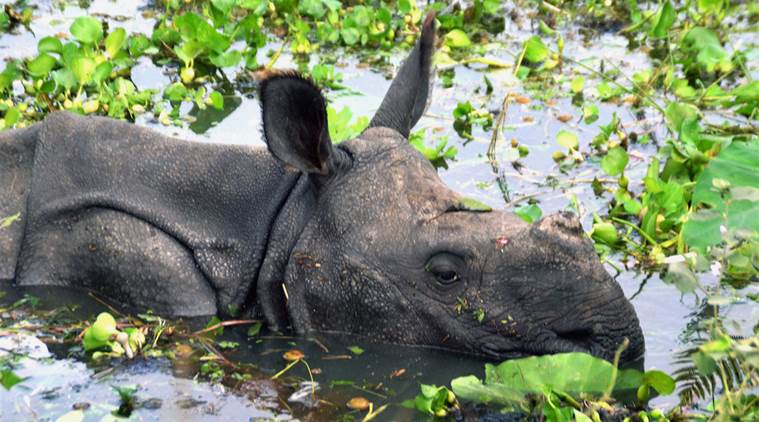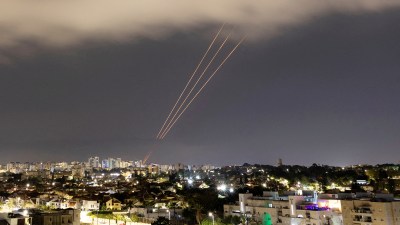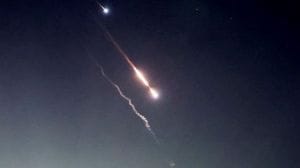- India
- International
Kaziranga film: BBC banned for 5 years from all national parks, sanctuaries
The documentary explored what it called the “dark secrets” of Kaziranga and asked if the war on poaching has gone too far.
 A young one-horned rhino trying to rise above water on the National Highway from the flooded grassland in Kothari village near Kaziranga National Park in Nagaon district of Assam. (PTI Photo, representational)
A young one-horned rhino trying to rise above water on the National Highway from the flooded grassland in Kothari village near Kaziranga National Park in Nagaon district of Assam. (PTI Photo, representational)
THE GOVERNMENT has prohibited the British Broadcasting Corporation (BBC) from filming in India’s national parks and wildlife sanctuaries for “irreparable damage done to India’s reputation”. Imposed with “immediate effect” on April 10, the five-year ban applies to filming for BBC documentaries and news reports.
As first reported by The Indian Express on February 15, the National Tiger Conservation Authority (NTCA) had in a showcause notice issued two days earlier criticised the BBC for “grossly erroneous” reporting and recommended the blacklisting of the BBC’s South Asia correspondent Justin Rowlatt for a documentary that highlighted the government’s “ruthless anti-poaching strategy” for the Kaziranga tiger reserve in Assam.
On February 27, the NTCA issued a memorandum, asking the chief wildlife wardens of all tiger-range states and field directors of tiger reserves not to grant filming permission to the BBC for five years.
The ministry’s April 10 order upholds and extends the ban from tiger reserves to all national parks and sanctuaries.
The latest order refers to the NTCA’s communication on February 27, regarding the “violation of terms and conditions of filming documentary by the BBC News, South Asia Bureau, New Delhi”.

It further states that the ministry “examined the matter” and found that the BBC “projected a negative, malicious and sensational portrayal of India’s conservation success story at Kaziranga Tiger Reserve”; “deviated from the original script submitted to the Ministry of External Affairs and NTCA”; and, did “irreparable damage. to India’s reputation. by telecasting the film worldwide”.
When contacted, a BBC spokesperson said: “The authorities’ reaction to this report on an important global issue like the appropriate way to combat poaching is extremely disappointing. The programme was balanced, impartial and accurately reported what we found on arrival. It covered both the successes achieved through India’s conservation policies and the challenges, which includes the impact on communities living next to the parks. We approached the relevant government authorities to ensure their position was fully reflected but they declined to take part.”
The spokesperson said that Rowlatt’s “original online story is still available on the BBC website as is the radio version of the documentary”.
According to sources in the ministry, at least four filming applications by BBC and its Natural History Unit (NHU) have been rejected by the ministry since March.
Aired in February, the documentary by Rowlatt explored what it called the “dark secrets” of Kaziranga and asked if the war on poaching has gone too far. It claimed that forest guards were given powers “to shoot and kill”.
The result, claimed the film, was that more people were killed by forest guards than rhinos by poachers: 23 people lost their lives compared to just 17 rhinos last year. In a BBC article introducing the film, Rowlatt also claimed that only two intruders were prosecuted while 50 were shot dead since 2014.
The film questioned the Kaziranga authority’s justification that the forest guards had engaged with heavily armed poachers. “Just one park guard has been killed by poachers in the past 20 years compared with 106 people shot dead by guards over the same period,” it claimed.
In July 2010, the Assam government offered immunity to Kaziranga forest staff under section 197(2) of the CrPC, 1973: “Only if it is held by an Executive Magistrate through an enquiry that use of firearms have been unnecessary, unwarranted and excessive and such report has been examined and accepted by the Government, then alone any proceeding including institution of a criminal case of any nature or affecting an arrest can be initiated by police.”
In the 11 years before this notification, between 2000 and 2010, 17 poachers were shot dead inside Kaziranga while 68 rhinos were killed. Since the notification, between 2011 and 2016, the number of poachers killed jumped to 59 and the number of rhinos poached to 103.
Apr 19: Latest News
- 01
- 02
- 03
- 04
- 05







































